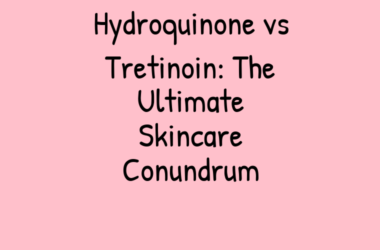Table of Contents
Uncovering the Power of Hydroquinone: A Game-Changer for Fading Dark Spots and Hyperpigmentation
Hydroquinone, a commonly used ingredient in skincare products, has been a topic of interest and controversy in the beauty world. While some swear by its ability to fade dark spots and hyperpigmentation, others claim it’s too harsh or even ineffective. In this article, we’ll delve into the world of hydroquinone, exploring its benefits, risks, and how to use it effectively to achieve a brighter, more even-toned complexion.
The Science Behind Hydroquinone
Hydroquinone, also known as quinol-4-ol, is a type of phenolic compound that inhibits the production of melanin, the pigment responsible for skin darkening. When applied topically, hydroquinone reduces the amount of melanin produced, resulting in a decrease in skin hyperpigmentation. This process is especially effective for fading dark spots, freckles, and melasma, common skin concerns caused by UV exposure, hormonal fluctuations, or inflammation.
How Hydroquinone Works
When used correctly, hydroquinone can penetrate deep into the skin, targeting melanocytes, the cells responsible for producing melanin. By inhibiting the enzyme tyrosinase, which converts tyrosine into melanin, hydroquinone prevents the production of excess melanin. This reduction in melanin production leads to a lighter, more even-toned complexion, effectively fading dark spots and hyperpigmentation.
The Benefits of Hydroquinone
While hydroquinone has been the subject of controversy, its benefits cannot be ignored. When used under the guidance of a dermatologist or with proper skincare knowledge, hydroquinone can:
-
- Fade dark spots and hyperpigmentation, resulting in a more even-toned complexion
-
- Reduce the appearance of melasma, a common skin concern caused by hormonal fluctuations
-
- Lighten areas of skin discoloration, such as freckles and age spots
The Risks and Precautions
While hydroquinone is generally considered safe when used correctly, it’s essential to be aware of the potential risks and precautions:
-
- Skin irritation: Hydroquinone can cause skin irritation, redness, and itching in some individuals
-
- Reversibility: Prolonged use of high concentrations of hydroquinone can lead to permanent skin lightening, making it difficult to reverse the effects
-
- Combination therapy: Hydroquinone is often used in combination with other skincare products, such as retinoids or vitamin C, which can increase the risk of side effects
-
- Pregnancy and breastfeeding: Hydroquinone is not recommended for use during pregnancy or breastfeeding due to the potential risk of skin discoloration in the baby
How to Use Hydroquinone Effectively
To get the most out of hydroquinone, it’s essential to follow these guidelines:
-
- Start with a low concentration: Begin with a low concentration (2-3%) and gradually increase as needed
-
- Use it consistently: Apply hydroquinone consistently, ideally at night, to allow the skin to absorb the product
-
- Mix it with other products: Combine hydroquinone with other skincare products, such as moisturizers or serums, to minimize irritation and maximize benefits
-
- Be patient: Fading dark spots and hyperpigmentation takes time, so be patient and consistent with your skincare routine
Conclusion
In conclusion, hydroquinone is a powerful ingredient that can effectively fade dark spots and hyperpigmentation when used correctly. While it’s essential to be aware of the potential risks and precautions, the benefits of hydroquinone make it a valuable addition to any skincare routine. By understanding how to use hydroquinone effectively, you can achieve a brighter, more even-toned complexion and say goodbye to unwanted skin discoloration.




